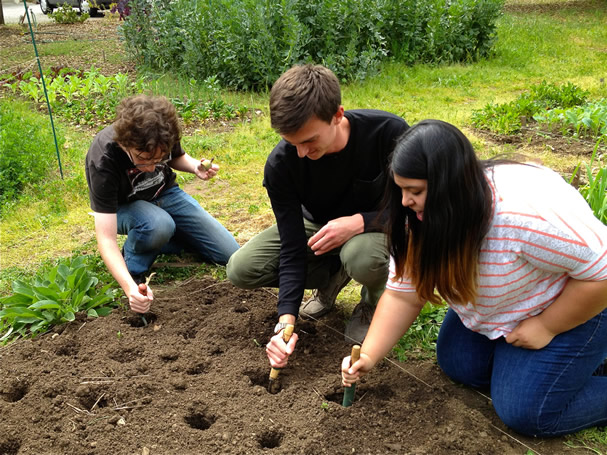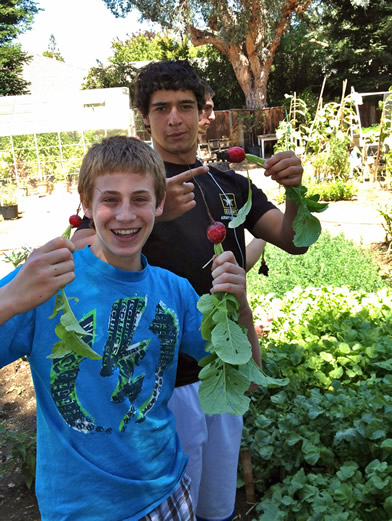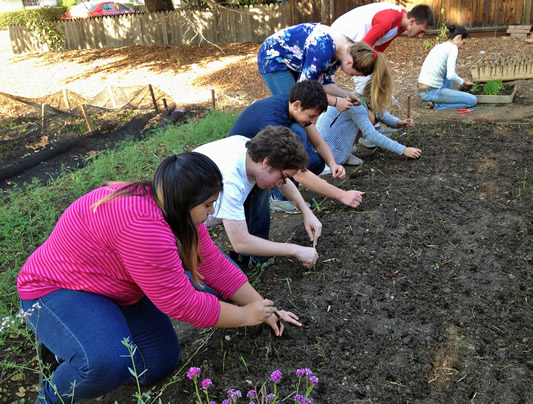Common Ground Garden Develops Edible Education
by Ecology Action Staff

Students Preparing to Plant a Biointensive Garden Bed.
Zuzanna Drozdz has been the Manager of Common Ground Garden in Palo Alto, CA, for 4 years. During her time there she has developed Ecology Action's first Edible Education program for youth. The following is a recent interview with Zuz..
Editor: How did you originally become interested in sustainable agriculture?
Zuz: Hearing John Jeavons speak on Earth Day in 2009 greatly sparked my interest in sustainable agriculture and more specifically planted the seed of purpose that drove me to join Ecology Action’s team. John shook me with his explanation of how our agricultural practices are destroying the planet's soil resources. I was particularly moved when I realized that it was the most disadvantaged populations that will suffer most deeply from our global disrespect of our soil. But John also offered hope: GROW BIOINTENSIVE®, Ecology Action’s resilient, closed-loop farming method that regenerates soil on a human time-scale. A year later, I joined Ecology Action to run the Common Ground Garden in Palo Alto, California. I felt fulfilled, both by the day-to-day work of gardening, and by finding a greater sense of purpose in working on a farming system so wholly committed to deep ecological sustainability.
E: Tell us about the evolution of your living classroom and the desire to bring the GROW BIOINTENSIVE method to students.
Z: When I first started working at Common Ground I sought to further develop the garden, improve the soil, and study the community to see how the garden could best serve its members. Soon I realized that there are 6 schools that serve more than 3,000 pre-K through 12th grade students within a 10-minute walk to Common Ground Garden. It was clear to me that this garden needed to serve these students. I attended the Edible Schoolyard Academy in June 2011, and it was their clearly laid-out roadmap and resources that inspired and guided me through the process of reaching out to teachers, better designing the garden for teaching, and developing our first lessons. We started our program in collaboration with Elizabeth Matchett, a Spanish teacher at Gunn High School. From there we expanded our offerings to include all pre-school, elementary and middle schools within walking distance of the garden.
E: Can you describe the garden classroom experience?
Z: We focus on offering multi-class units that give students the full seed-to-table experience, rather than individual lessons that only provide a brief glimpse of the garden. We want students to bond with their plants and with the space. We want them to watch the garden grow and change over time. Our students use all of the techniques that GROW BIOINTENSIVE farmers use to get a better yield and to feed the soil; our classes incorporate these techniques as core skills that students can learn while learning science, math, or language content.
E: What has interest in this class been like?
Z: Generally students are very enthusiastic about coming to the garden, particularly after we’ve worked with them for a while. Initial response often depends on a student’s previous experience with the outdoors; some are immediately comfortable, others may be timid. We’ve found that providing gloves and kneeling pads helps students who are initially fearful of critters, or uncomfortable with getting dirty, to get involved and ultimately dispel their discomfort. Students also benefit from a culture of exploration and non-judgment; they are encouraged to use specific words to describe vegetables new to them, rather than just calling them “gross”. This also prevents these students from discouraging others who might be on the fence.
E: What has the response among teachers and parents been to this project-based learning?
Z: The response from students, teachers, and parents has been very enthusiastic—particularly regarding this year’s middle school pilot class. Parents have been very grateful for the opportunity their students have to come and learn in the garden. Our favorite moments during end-of-the-year parent celebrations are when students show their parents around the garden and teach them about the vegetables and plants they’ve been growing!
E: A lot of a garden’s production takes place during the summer when school’s not in session. How is this handled?
Z: As far as school gardens go, Common Ground Garden is both a school garden for multiple schools and a demonstration garden for Ecology Action’s GROW BIOINTENSIVE method. Therefore our staff focuses on Edible Education classes throughout the school year, but we also maintain the garden throughout the summer. It is possible to plan a school garden, however, where much of the summer planting is done by the end of May and does not ramp up again until August. In order to accomplish this, I recommend preparing the garden for a major planting party in mid to late May and choosing varieties that will take the majority of the summer to mature. This will ensure that crops will be coming into production when school starts again and that there won’t be too much spoiled/neglected food during the summer. Although the majority of the summer planting can happen before summer, each school garden needs someone to maintain the garden—caretaking, watering or checking on the weeding. Having some greens and other early vegetables ready for mid-summer harvesting is a nice reward for your summer caretaker(s)!
E : How do you use what the garden produces?
Z: We share the garden produce with the communities that are invested in it: the students, our volunteers, and the church members of the Palo Alto Christian Reformed Church that leases us the land. We try to have our students harvest something and eat it fresh out of the garden every time they come to visit. We’ve found that having a supply of kids’ favorites, like carrots, peas, lettuces and kale, guarantees that lots of produce is eaten by the students.
E: Tell us about the development of the curriculum.
Z: These past several years we’ve invested in building strong teacher relationships and running pilot programs to prove to ourselves, our students, and our community that we can deliver high-quality gardening lessons. We’ve worked with teachers from different subjects and age groups to develop and teach classes that fit into their curricula. These highly personalized lessons have been a great learning opportunity, but it’s time to develop curriculum that we can offer on an ongoing basis. This will reduce the need to constantly develop new lessons. This curriculum will need to be based on, and linked to, the new state education standards.
E: What are your plans for the immediate future?
Z: This summer I will start studies to get my Masters in Landscape Architecture from the University of Pennsylvania. I am excited to take what I have learned at Ecology Action with me.

Students Planting Seedlings Together
.
top | Newsletter Home | Article Index | Archive

|





